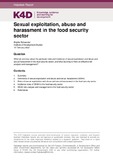| dc.contributor.author | Rohwerder, Brigitte | |
| dc.coverage.spatial | Guinea, Liberia, Colombia, Democratic Republic of Congo, Liberia, northern Uganda, Burundi, North-East Nigeria, Mozambique, Lebanon, Syria, Burkina Faso, and Ethiopia | en |
| dc.date.accessioned | 2022-05-30T14:37:33Z | |
| dc.date.available | 2022-05-30T14:37:33Z | |
| dc.date.issued | 2022-02-16 | |
| dc.identifier.citation | Rohwerder, B. (2022). Sexual Exploitation, Abuse and Harassment in the Food Security Sector. K4D Helpdesk Report 1097. Institute of Development Studies. DOI:10.19088/K4D.2022.062 | en |
| dc.identifier.uri | https://opendocs.ids.ac.uk/opendocs/handle/20.500.12413/17441 | |
| dc.description | Guinea, Liberia, Colombia, Democratic Republic of Congo, Liberia, northern Uganda, Burundi, North-East Nigeria, Mozambique, Lebanon, Syria, Burkina Faso, and Ethiopia | en |
| dc.description.abstract | Globally food insecurity is rising, especially for women and girls, potentially placing them at increased risk of sexual exploitation and abuse in their attempts to access food. Most of the existing literature focuses on sexual exploitation and abuse than on sexual harassment, and the literature focusing on sexual harassment tended not to specify the organisations involved making it hard to identify if they are in the food security sector. Most of the literature seems to focus on sexual exploitation and abuse relating to food security in humanitarian rather than other settings Sexual exploitation and abuse and sexual harassment is widely underreported across the aid sector and data is not routinely collected indicating whether or not the case relates to food security programming. This report thus aims to discover what is known about the particular risks and incidence of sexual exploitation and abuse and sexual harassment in the food security sector, and what learning is there on effective risk analysis and management. Several recommendations from the literature for food security actors are provided at the end of the report, including suggestions from beneficiaries for measures that could be taken to make food distribution processes safer. | en |
| dc.description.sponsorship | Foreign, Commonwealth and Development Office (FCDO) | en |
| dc.language.iso | en | en |
| dc.publisher | Institute of Development Studies | en |
| dc.relation.ispartofseries | K4D Helpdesk Report;1097 | |
| dc.rights.uri | https://www.nationalarchives.gov.uk/doc/open-government-licence/version/3/ | en |
| dc.subject | Gender | en |
| dc.subject | Security and Conflict | en |
| dc.title | Sexual Exploitation, Abuse and Harassment in the Food Security Sector | en |
| dc.type | Helpdesk | en |
| dc.rights.holder | © Crown copyright 2022 | en |
| dcterms.dateAccepted | 2022-02-16 | |
| rioxxterms.funder | Default funder | en |
| rioxxterms.identifier.project | K4D | en |
| rioxxterms.version | VoR | en |
| rioxxterms.versionofrecord | 10.19088/K4D.2022.062 | en |
| rioxxterms.funder.project | 0986883a-6d0f-4bb8-9c46-5e0682934d65 | en |

